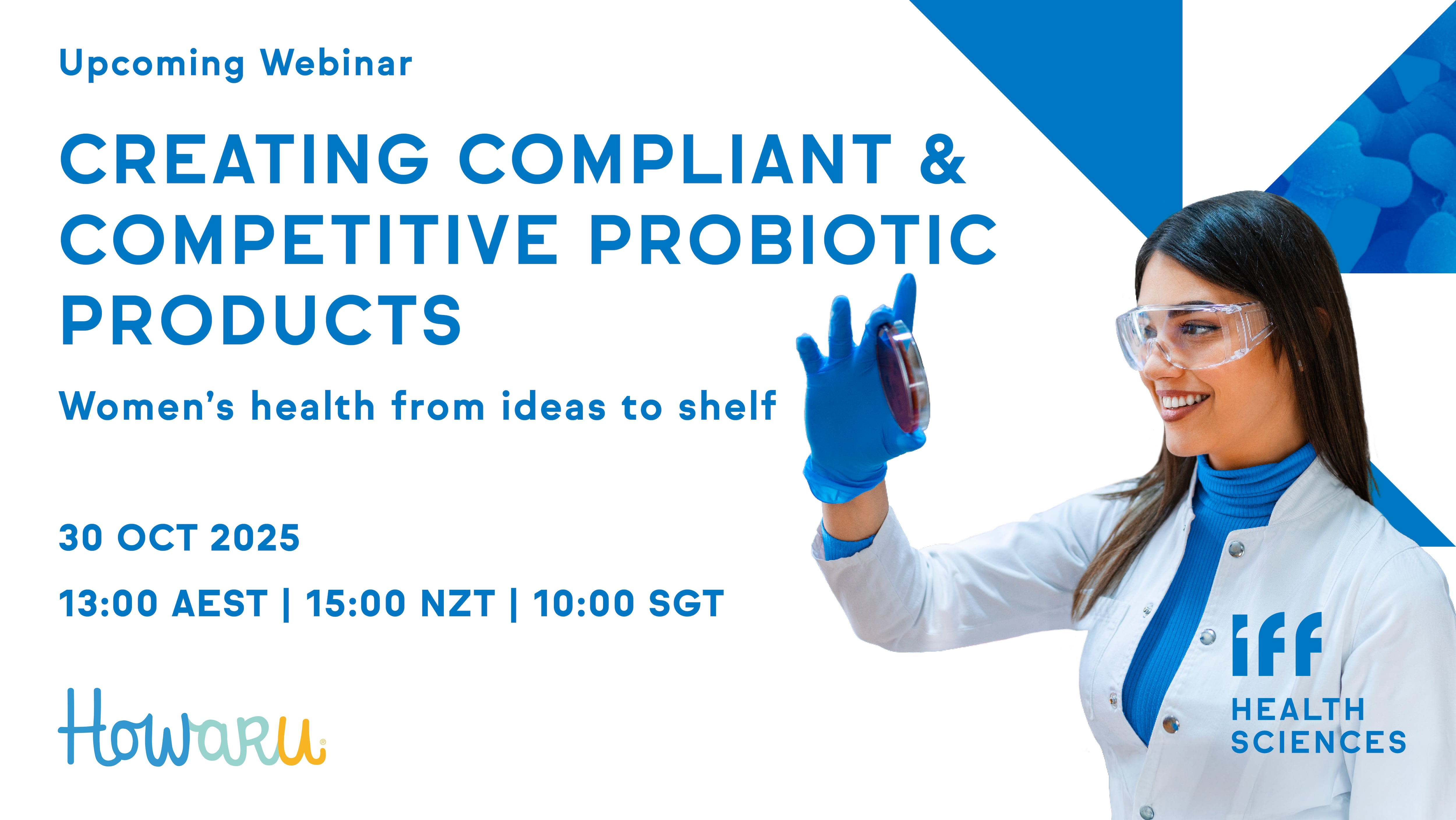COVID-19 drove consumer interest in health and wellness to record levels in 2020, accelerating the rise of the already fast-growing dietary supplement industry. The trends created major opportunities for supplement manufacturers to improve global health while growing sales. Yet, in a fast moving and increasingly fragmented and complex market, manufacturers need to overcome challenges to seize those opportunities. IFF (formerly DuPont Nutrition & Biosciences) is helping its partners meet those challenges.
The global dietary supplement industry was growing quickly when the pandemic began.1 More and more consumers were taking a holistic, proactive approach to health and wellness, leading them to seek out products designed to prevent problems before they arise. COVID-19 accelerated the trend. Suddenly, immune health became a top priority for large numbers of consumers around the world.
To understand how the pandemic has shaped the North American supplement, health and nutrition sector, NutraIngredients-USA.com and IFF (formerly DuPont Nutrition & Biosciences) surveyed industry professionals on topics such as the changing level of consumer interest, sales growth and the toughest problems they face. The results reveal an industry that is adapting to the new needs of consumers in a highly dynamic market.
How the pandemic affected health and wellness
The role ingredients such as vitamin D and zinc play in immune health became a mainstream topic of discussion in 2020. The industry felt the effect of the growing interest in immune health. Ninety-five percent of survey respondents said consumer interest in the power of nutrition to boost health and wellness and support immunity has never been higher.
That interest is translating into sales growth. Almost two-thirds of respondents said their companies experienced “surging sales” from March to July 2020 as consumers took more control of their health and wellness. The effect of the pandemic on immune support products may be lasting, with some respondents predicting the traditional seasonal peaks and troughs in supplement sales may give way to high, sustained levels of demand for several years.
The rising interest in dietary supplements extends well beyond immune health. Survey respondents identified stress management as the category that received the second biggest pandemic-fueled jump in demand, reflecting consumer interest in products to help manage the mental toll of the pandemic. Respondents named sleep support and probiotics as the other two big winners of 2020, again indicating the value consumers are placing on the management of their mental and immune health.
Developing products that are proven to satisfy those demands is hard. Respondents cited ensuring ingredients enable health claims as the toughest problem they face in developing supplements. Yet, enabling health claims is just one of many tough challenges.
Dietary supplements must also cater to consumers’ health and ethical priorities. The industry is well aware of that need. Survey respondents listed non-GMO, plant-based and organic as the three claims their companies are paying most attention to. Respondents also named finding a plant-based ingredient that performs as one of the biggest challenges they face.
The focus reflects changes in American society. Almost half of Americans now follow diets that reduce or eliminate consumption of animal products.2 Equally, 51% of Americans now think products with genetically modified ingredients are worse for their health, up from 39% of people in 2016.3 Most Americans say organic produce is healthier than products made with pesticides and fertilizers.4
Consumers want to know what is in the products they buy, be it a gummy, a capsule or a pill; they also want the products to be convenient to consume and to have the desired sensory products.
Products that lack the right aesthetics, taste, texture and mouthfeel are unlikely to succeed, at least outside of small populations focused solely on performance. That fact causes problems. Survey respondents named delivering on consumer preferences as the second toughest challenge they face. Consumer experience and convenience is critical.
In trying to address that array of challenges, manufacturers cannot typically implement solutions that add significantly to the price of their products. Consumers are sensitive to the price of supplements and have access to lower-cost alternatives, further complicating the task facing manufacturers.
Why collaboration is a recipe for success
Supplement manufacturers can draw on the support of collaborators when trying to address the challenges they face. By closely collaborating with other participants in the value chain, supplement manufacturers can leverage the expertise and capabilities of their networks to efficiently create and deliver products with the range of features consumers expect.
Ingredient suppliers are particularly important contributors to such collaborations. Leading suppliers do more than just sell ingredients; they provide expert input into questions such as how to formulate an active into a gummy or increase the throughput at a critical bottleneck in the production process.
IFF (formerly DuPont Nutrition & Biosciences) has demonstrated its value to its collaborators again and again. For example, by working with soft gel customers IFF (formerly DuPont Nutrition & Biosciences) has successfully qualified and implemented SeaGel, a seaweed-based soft capsule technology. SeaGel is a clean-label, vegan and non-GMO alternative to gelatin that enables manufacturers to meet demand for plant-based products.
Importantly, SeaGel also reduces cross-linking, eliminates melting and supports efficient formulation development and production. IFF (formerly DuPont Nutrition & Biosciences) provides an in-depth technical service and support from the first lab trial onward, maximizing the chances of quickly delivering a product that meets the needs of consumers and the manufacturer alike.
Manufacturers work with IFF (formerly DuPont Nutrition & Biosciences) to identify and resolve bottlenecks, optimize processes and assess the impact of replacing the excipient used in a formulation. With that support, manufacturers can engage in the rapid innovation needed to be competitive in a dynamic, fast-moving market while continually improving the quality and efficiency of their production processes.
The company provides that level of support across a wide range of dosage forms, including tablets, soft capsules, hard capsules and gummies. In each case, IFF (formerly DuPont Nutrition & Biosciences) applies its expertise to deliver a product with the desired characteristics, for example by ensuring a gummy has a pleasant, pliable texture and improved mouthfeel.
Conclusion
The survey run by NutraIngredients-USA.com and IFF (formerly DuPont Nutrition & Biosciences) reveals why supplement manufacturers need the support of their ingredient suppliers more than ever. Interest in supplements rose to record levels as the COVID-19 crisis emphasised the importance of acting proactively to improve health and wellness. Those new consumers of supplements want products that deliver specific health outcomes and match their ethical positions on topics such as GMOs.
IFF (formerly DuPont Nutrition & Biosciences) is helping supplement manufacturers develop and deliver products that meet those exacting criteria using ingredients such as SeaGel and associated expertise. By tapping into those capabilities, supplement manufacturers can stay ahead of a fast-moving market and meet growing demand for proven, clean-label products that improve the health of consumers.
References
1. Research & Markets. Global Dietary Supplements Market: Size, Share & trends (2020-2027). https://www.globenewswire.com/news-release/2020/03/10/1997963/0/en/Global-Dietary-Supplements-Market-Size-Share-Trends-2020-2027.html (2020).
2. Flexitarianism on the Rise in U.S., Reports Packaged Facts. PR Newswire https://www.prnewswire.com/news-releases/flexitarianism-on-the-rise-in-us-reports-packaged-facts-301154622.html (2020).
3. 51% of Americans say GMO-derived food is unhealthy, 59% know very little about it, Pew survey shows. https://geneticliteracyproject.org/2020/03/19/americans-who-say-they-know-a-lot-about-gmos-think-theyre-unhealthy-pew-survey-shows/ (2020).
4. Topic: Organic Consumers. https://www.statista.com/topics/4738/organic-consumers/.








